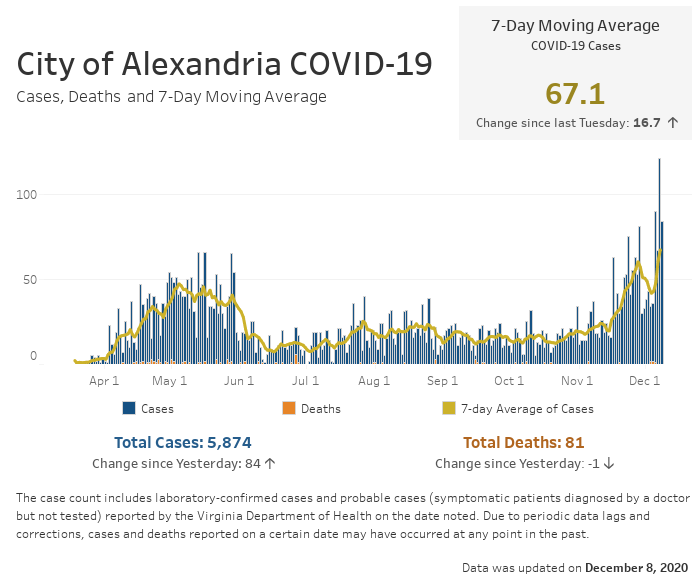For Immediate Release: December 8, 2020
The City of Alexandria and the Alexandria Health Department (AHD) remind everyone that you are safest at home. Older adults and persons with underlying medical conditions are at greater risk for severe disease and are advised to minimize potential exposures as much as possible. To stop the spread of COVID-19, the state order and City ordinance require everyone to wear a mask over their noses and mouths in indoor public places and when at least 6 feet of physical distance cannot be maintained between those of different households in outdoor public places, with limited exceptions. Your neighbors and loved ones are counting on you.
COVID-19 vaccines are on their way and the City has developed a vaccine webpage to help residents learn more about their safety, how they work, and when vaccines may be available. COVID-19 vaccines are a key ingredient to reduce illness, save lives, and return to normalcy in Alexandria. Learn about the types of vaccines that are in the final stages of approval with the FDA, how they were developed and the steps involved in being proven safe for the public. Find out whether costs will be involved in receiving the vaccine, the order in which residents will be prioritized for receiving the vaccine, and more. Updates will be added to the webpage as more information is available, including who can be vaccinated first and where vaccines will be offered. Ask questions and learn more by attending virtual “ COVID-19 Vaccine Community Conversations” hosted by the Virginia Department of Health.
One type of COVID-19 vaccine in development is an mRNA, or messenger RNA vaccine, which is new in the fight against infectious diseases, but has been studied by researchers for decades. Vaccines typically use a weakened or inactivated form of a virus to teach the body to create an antibody response and ultimately develop immunity to it. Administered to the upper arm, the mRNA vaccine delivers instructions to the muscle cells to learn how to produce the protein of the virus. Once the body does that, it breaks down the instructions and gets rid of them. The body then recognizes that the protein doesn’t belong there and begins to attack it with antibodies. The body’s white cells called T-lymphocytes, or T-cells, develop a memory of the virus, so that it knows how to fight it in the future. This vaccine does not impact or modify DNA. The COVID-19 mRNA vaccine will be subject to the same standards as all other vaccinations and once approved, will be studied as it is distributed to the public.
Statewide mitigation measures require that everyone age 5 and older wear a mask to prevent the spread of COVID-19. The Centers for Disease Control and Prevention offers guidance on the importance of how to select, wear, and care for masks in order to receive maximum benefit.
Selecting a mask: Cloth masks and gaiters should be made with two or more layers of washable, breathable fabric. Gaiters can be folded over to create two layers. Masks with a nose wire can help reduce fogging of glasses. It is best to avoid masks made from materials that restrict breathing, that have valves or vents, or are needed by first responders and healthcare workers, such as N95 respirators. The effectiveness of face shields is unknown but being studied.
Properly wearing and removing a mask: Masks should cover the nose and mouth completely and fit securely under the chin and snugly against the sides of the face, with no gaps. While wearing a mask, do not touch the front of it, as it may be contaminated with COVID-19 droplets. Apply hand sanitizer or wash hands for at least 20 seconds if there is contact with the front of a mask and after removal. When adjusting or removing a mask, only handle the straps, avoid contact of the front of the mask with eyes, nose and mouth.
Caring for a mask: Cloth, reusable masks that are dirty or wet should be stored in a plastic bag until ready to be washed, and should be washed soon after removal to prevent mold. Masks can be washed with regular laundry using laundry detergent, but should be washed in the warmest water temperature appropriate for the fabric and dried in the dryer on the highest heat setting until completely dry. Masks can also be washed by hand and air-dried, as long as they are completely dry before use. Store clean masks in a breathable paper or fabric bag until ready for use.
Download, print or share the City’s multilingual Tips for Using Masks flyer as a quick reference of the highlights of these guidelines. To request printed copies, please submit a COVID-19 Catalog Resource Request.
The chart below, containing the seven-day moving average number of COVID-19 cases and the daily and cumulative case and fatality counts, provides detailed information about how preventive measures are impacting Alexandria's response to the pandemic. An interactive version is available at alexandriava.gov/114883. Detailed data, including data on age, race and ethnicity, are available through links at alexandriava.gov/Coronavirus.

AHD estimates that approximately 1 in 15 Alexandrians who tested positive for COVID-19 have required hospitalization. An estimated 66% of Virginia adults who become infected never have symptoms. The best ways to stop the spread of COVID-19 remain wearing a mask in public, maintaining at least 6 feet of distance from others, and frequently washing your hands or carrying and using hand sanitizer with at least 60% ethyl alcohol. Help your loved ones and neighbors by answering a call from AHD if identified as a close contact of someone who tests positive for COVID-19, and download the Virginia Department of Health’s COVIDWISE app to be quickly and anonymously notified of likely exposure to the virus.
© 1995–2022 City of Alexandria, VA and others • Privacy & Legal • FOIA Requests